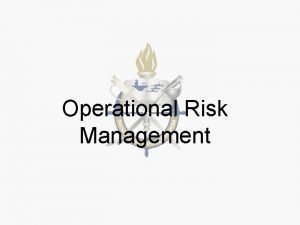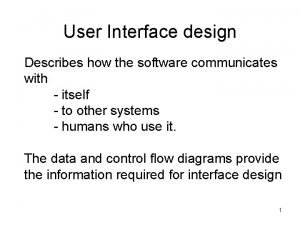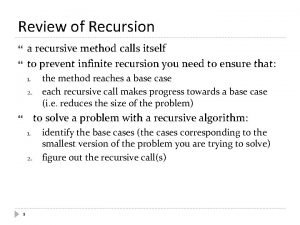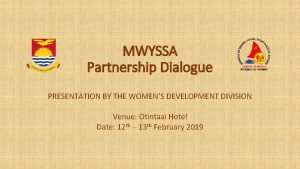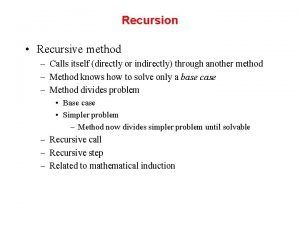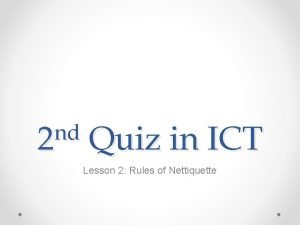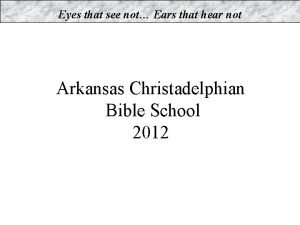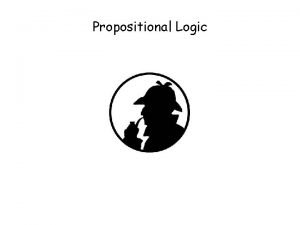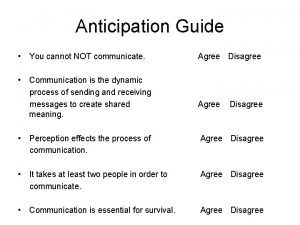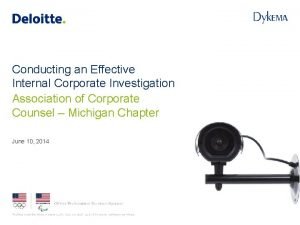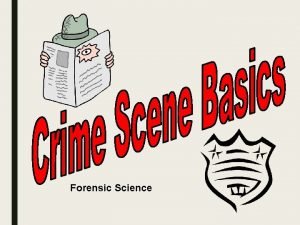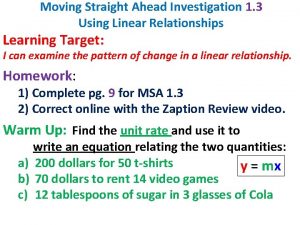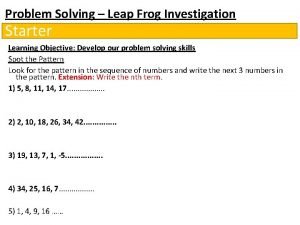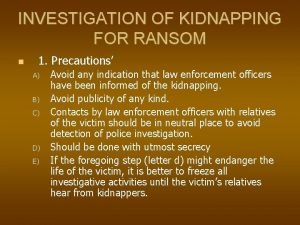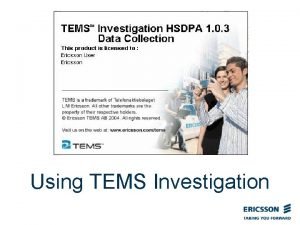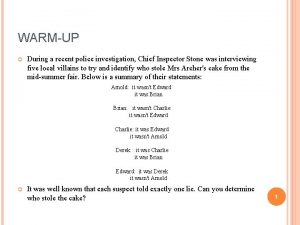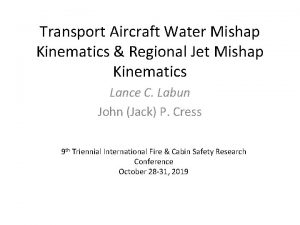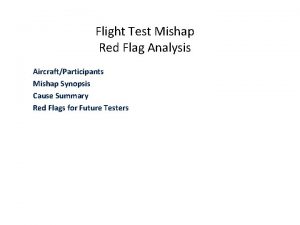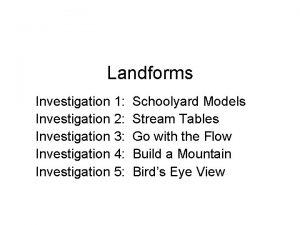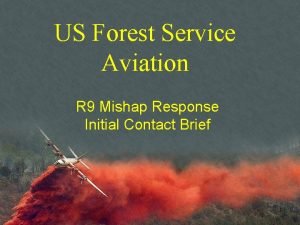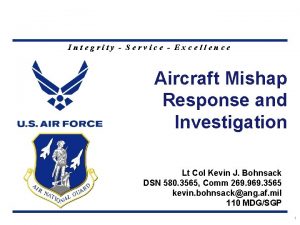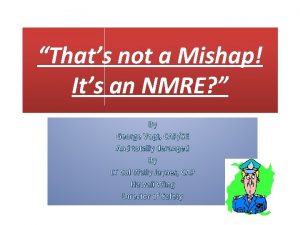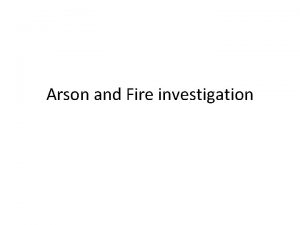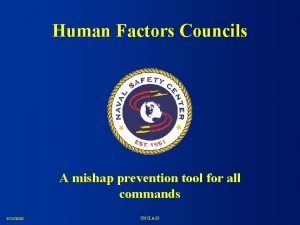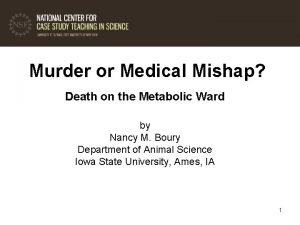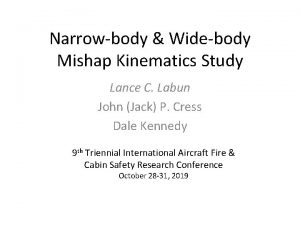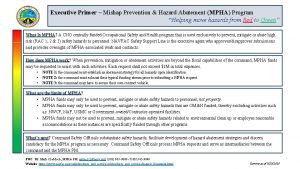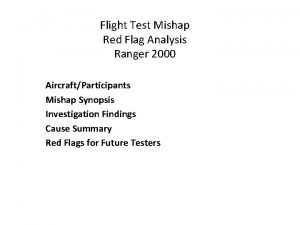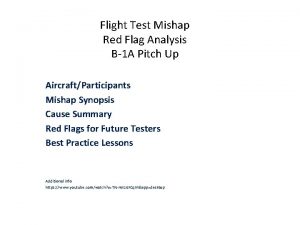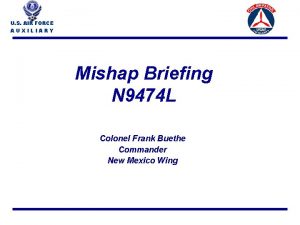Aviation Mishap Investigation Aviation in itself is not











































































- Slides: 75

Aviation Mishap Investigation Aviation in itself is not inherently dangerous. But to an even greater degree than the sea, it is terribly unforgiving of any carelessness, incapacity or neglect. Author Unknown 1

Fort Myer, Virginia 17 September 2008 • Orville Wright arrives to demonstrate the newest model airplane • Cash incentive of $1. 00 per every mile per hour over a baseline of 35 MPH • Wilbur and Orville made the propeller extra long for additional thrust for additional speed • West Point grad, Lt Thomas Selfridge, sweet talks his way into a getting a ride • Orville is 70 feet AGL and in a slow, gentle turn above Ft Myer… 2

First Ever Airplane Crash Produces Injury and Fatality 3

Almost 60 Years Later a C-141 B Starlifter Diverts (12 Jan 1987) • • Iwakuni, Japan – 600 Miles SW of Tokyo – 120, 000 Population – Hanshu Island (oceanic tip) – Airfield originally built in 1938 for Japanese Navy flight training U. S. Marine Corps Air Station (following operation by RAAF) Night IMC prevailed – Rain – Wind Fast approach speed and touchdown – Hydroplaning 4

Hydroplaning Conditions, Context and History • Post Korea conflict research develops 2 fix categories for hydroplaning – Runway and airfield development o Grooves in pavement o Crowning o Perimeter drainage augmentation – Tire pressurization o Mathematical formula: Hydroplane Speed = 9√(Tire Pressure) o Tires designed to have higher pressures for approach speeds § 121 psi to 144 psi § Elevates hydroplaning speed to » 9√ 121 = 9*11 = 99 knots » 9√ 144 = 9*12 = 108 knots » Speeds in tune with most planned touchdown speeds o Aircrew training “forgot” these valuable hydroplaning lessons 5

Hydroplaning Lessons for Personal Vehicles Originating from Aeronautical Science • Just as seat belts originated with open cockpit airplanes and migrated to automobiles and trucks, so can hydroplaning critical entry speeds – Lets apply the formula: Hydroplaning Speed = 9√(Tire Pressure) to various tire pressures found in personal vehicles o 25 psi – 45 mph o 28 – 47. 6 o 30 – 49. 3 o 32 – 50. 9 o 34 – 52. 5 o 36 – 54 – Take proactive steps to make tires have correct maximum pressure and slow down to below calculated hydroplane speed for safe vehicle operations on wet roadways 6

General Hap Arnold Implements a Proactive Approach to Understanding and Mitigating Aviation Mishaps • Establishes the “Flight Safety Directorate for Investigations and Trend Analysis” to examine every aircraft mishap • Points out that more aircraft were destroyed in 1942 training and transport than in all the air war of the same time period in both the European and Pacific Theaters! • Causes: – 85% Logistics – 15% Aircrew • Establishes the precedent of data-driven decision-making that originates with observations, measurable data collection and analysis • Leverages his considerable liaisons with industry for expert help and partnership from the airplane design stage through its operation and maintenance support 7

General Arnold’s Forensic Anatomy of a Mishap • • When Where What Who Damage$ Narrative / Investigation / Analysis Findings / Causes Recommendations Define Measure Analyze Improve / Control Lean Principles …and how its common sense aligns with DMAIC & Lean 8

U. S. Air Force Mishap Classifications • Class A: Total destruction of an aircraft, damage of $1 million or more, or a fatality or permanent total disability. • Class B: Total cost of $200, 000 or more but less than $1 million, or a permanent partial disability, or inpatient hospitalization of three or more personnel. • Class C: Total cost of $10, 000 or more but less than $200, 000, or an injury or occupational illness resulting in a loss of 8 hours or more. • High Accident Potential (HAP): Events where there is a potential significant hazard to the crew or aircraft if a similar event were to occur. 9

The Actual Mishap Report – Mechanics Part II • Part I – Releasable – Material facts o Define o Measure • Part II – Non-Releasable o Secures cooperation from manufacturers – Interpretations o Analyze o Improve o Control 10

Safety Investigation Board (SIB) • Purpose – Determine cause or causes – Provide basis for corrective actions o No disciplinary or punitive actions – Eliminate mishap potential and prevent future mishaps • All testimony before SIB has immunity – Want assistance in eliciting all facts 11

SIB Primary Members • President – Rated Colonel or General – Appointed by MAJCOM – Not from mishap unit • Pilot Member – Current & qualified in mishap aircraft – Wide experience • Maintenance Member – Fully qualified with 2 years experience • Investigator – Rated officer with 4 years flying experience – Graduate of Flight Safety Officer course – Appointed by MAJCOM • Recorder – Non-voting member – All administrative affairs and coordination 12

SIB Additional Members • • • Flight Surgeon Public Affairs Officer Air Traffic Control Officer Weather Officer Weapons Officer Additional Crew Members Tech Reps from depot and/or industry Pathologists Federal Agencies – FAA – FBI – NASA – NTSB – USAF Office of Special Investigations (OSI) 13

SIB Guidelines • 30 Days start-to-finish • SIB Report protected by “Executive Privilege” • Accident Investigation Board (AIB) is separate investigation – Legal investigation (Judge Advocate) – Convened by Wing Commander up to MAJCOM Commander – Concurrent with SIB – Shows “credibility” to taxpayer and is fully releasable – The “Hammer” to military and/or civilian members – Receives “Part I” of SIB report and “Witness list” • USAF deliberately segregates the two boards and limits their interactions – Major General exercised the “early” retirement option as a result of selectively using SIB information to make punitive examples of aircrew members involved in incidents 14

Investigation Synopsis • Impound and Close All Records – – – Aircraft maintenance Aircrew Air traffic Medical Weather • Crash Site Actions – – Photographs Diagram wreckage Identify parts Gather statements • Flight Profile Determination – – Aircrew Witnesses Flight plan Pre-flight activities – Wreckage pattern 15

Heart of the Investigation • Gather and interpret evidence – Determine sequence of events – Use data collected to determine mishap causes – Draw upon all information sources o Aircraft design through maintenance o Human capital training through operational execution o Management and supervision o Environment of the mission – Validate findings – Publish – Report is coordinated and staffed up through the MAJCOM o Many edits from Wing, Air Division and Numbered Air Force – Report goes to the Flight Safety Center o Safety Center reviews and often goes back to original Flight Safety Officer report 16 o Flight Safety Center has the ultimate “final word”

Mishap Cause Factors • Human – aircrew, maintenance, support • Supervisory – instructors, “boss”, procedures, directives, manuals • Logistics – acquisition, material, maintenance • Environmental – weather, temperature, light, flora and fauna • Support – infrastructure (meals, sleeping, lounge); services • Undetermined – often never identified 17

High Accident Potential (HAP) Criteria 1. 2. 3. 4. 5. 6. 7. 8. 9. 10. 11. Loss of thrust Engine case penetration Engine case rupture, burn through, fire, massive fuel leak Emergency landing of single-engine aircraft Unselected propeller / thrust reversal Flight control malfunction (Attitude, Heading, Altitude) Spillage or Leakage In-flight pitot-static or gyroscopic instrument loss Runway departure All in-flight fires Any other FSO option event (example will be discussed later) 18

Determine Flight Profile • Aircrew • Witness statements • Mission flight plan • Aircrew pre-flight briefing record • Wreckage pattern 19

Crash Site Actions • Photographs • Diagram wreckage • Identify parts • Gather statements 20

Brigadier General Robin Olds Establishes the Flight Safety Center (1971) with a Focus on Data-Driven Analysis and Enhances Arnold’s Original Vision • America’s 1 st and only “Triple Ace” • Grew up around Billy Mitchell, Hap Arnold, Carl Spaatz, and other early air power advocates • All-American as football “Tackle” • Charismatic maverick • Set in motion the “Thunderbirds” ground work • “There are pilots and there are pilots; with the good ones, it is inborn. You can't teach it. If you are a fighter pilot, you have to be willing to take risks. ” • Transformed Flight Safety from “bean counting” to being part of making air combat operations more effective • 14 July 1922 – 14 June 2007 21

Flight Safety: Post Robin Olds • Flight safety facilitates mission effectiveness by qualitative and quantitative use of resources • In military aviation, “flight safety is NOT paramount”… contrary to many a mission briefing – Mission objectives are primary – Safety supports mission objectives by making resources available • Mishap Causes – Reversed from Arnold’s days: – 15% Logistics – 85% Aircrew • John “Forty Second” Boyd built upon General Olds maverick approach – Father of “energy maneuvering” for light-weight, high-tech fighters – Developed the OODA Loop o Observe – Orient – Decide – Act – OODA is the foundation for AFSO 21 st Century o Air Force Smart Operations 21 o Lean Six Sigma, CPI and other proactive implementations 22

Human Factors and CRM Play Key Role in Mishap Analysis & Mishap Prevention • • • Frank Dully, Captain, USN (MD – Flight Surgeon) “Father of Human Factors” HF fall into 3 broad categories: – Aeromedical o Aeronautical adaptation (psychological and physical) o Illness, disease, injury o Physical factors – fatigue, rest, physical activity, mental workload, environmental o Aviation physiology – water/land survival, hypbaric exposure, ejection/egress training, G-tolerance, visual illusions, task management, etc – Personal / Social o Emotional stress – family/marriage, financial, personality, etc. – Performance o Flight o Ground Dully’s “Sex and the Naval Aviator” lecture series – Air Force politically correct name “Aircrew Compartmentalization” 23

Representative Mishaps • Human factors often work against the Man-Machine interface – Consider the 4 mph “man” (with internal systems) and 600 mph “machine” (with internal systems) … opportunities for disconnects 24

T-37 Solo: Stall-Spin Following VMC into IMC 25

Vance AFB Auxiliary Airfield Instructor Beer Bet ~ The Unanticipated ~ Bar tab for the ultimate “Beer Bet of Honor” $0. 35 Officer Club Draft Beer $250/Hr T-37 Operating Cost $850, 000 T-37 Acquisition Cost • Auxiliary airfields are non-towered and use 2 IPs as Supervisor of Flying (SOF) for solo student pilots practicing touchand-go landings • Because the IPs were running early, they challenged each other to precision landings: Land as close as possible to the approach-end of the runway with ONLY one throttle thrust setting • The approach-end of the concrete runway protruded above the surrounding grass field • This protruding concrete edge guillotined the Tweet’s landing gear • First student solo arrived and was unable to make radio contact. He returned to main base and reported an airplane collapsed on the runway with a small fire on the right leading edge wing root 26

Lesson-Learned Outcome Led to “Consistent, Precision Landings” in Training and Checkrides Main landing gear touchdown point at a predetermined point on the runway is • Repeatable • Reproducible • Scientifically substantiated • Universally applicable • Reasonable expectation • Meets or exceeds Six Sigma accuracy Airline operations provided baseline to Air Force (and airliners were baselined against US Navy carrier landings) FAA implemented “precision landings” – accuracy within 200 ft – for private pilot applicants (and above) in 1986 (Six Sigma accuracy) 27

C-141 Weekly Sortie to Pan American Capitals Huayna Potosi near La Paz, Bolivia 18 August 1974 • Departed Howard AB, Panama for 1, 800 NM flight over uninhabited jungle with limited nav aids • Cleared for enroute descent in IMC, in non-radar environment, from FL 240 to FL 180 for landing in La Paz (highest elevation airport) with ceilings at 700 AGL • Impacted Mt Potosi (20, 000 ft) at the 18, 700 ft level. Crew of 7 fatally injured at impact. • Waited 3 months for winter to pass before attempting body recovery and mishap investigation – Helicopters not capable at these altitudes 28

La Paz VOR Approach • La Paz is world’s highest elevation airport at 13, 325 Ft mean sea level • It is ringed by high Andes Mountains often cloud covered • High mountains embedded within clouds are referred to as “Cumulo -Granite” • Must reference descent on VOR and stay close to VOR inside the mountain basin that is rimmed by rocks • No margin for error! • Mishap crew started descent from FL 240 and did not stay within the 29 rock-free basin

YB-49: The Original Northrop Flying Wing • • • Muroc Field renamed “Edwards AFB” Topeka Field (KS) renamed “Forbes Field” • 5 June 1948 Major Dan Forbes and Captain Glenn Edwards are at the controls While in a nose high stall, the airplane entered a tail slide, followed by a high-speed tail down spin that led to in-flight structural break-up. Engines were not powerful enough to recover the airplane. – Underpowered for speed Flying was viewed as a “slow” medium-range bomber, with limited bomb capacity at best Air Force was not interested in its “stealth” qualities until early 1980 s Jack Northrop “vindicated” when B -2 Stealth Bomber proves his advanced design fully capable 30

Student Pilot Performs Split-S Maneuver • • Vertical turn-around (reverse direction) maneuver from level flight to lower altitude and opposite direction T-38 requires 10, 000 ft altitude to execute the maneuver Student pilot misread altimeter and was not at 18, 800 ft but at 8, 800 ft Airplane impacted the ground at Mach 0. 92 (552 knots) indicated with an ensuing fatality and destroyed airplane 31

Results of Split-S with Inadequate Altitude • • Mishap debris relocated to hanger for reconstruction and analysis No ejection attempted 32

Engineering Change Modifications Re-engineered Altimeter Applied Human Factors Considerations Original Altimeter 33

T-38 Attempted Barrel Roll with Runaway Trim • • • Procedures Count! Technique Is Important! Student Pilot (SP) developed habit of using 2 -hands for barrel rolls and loops Left hand was on top the ‘Aileron–Elevator Trim Button’ On mishap day, SP activated (unintentionally and unaware) worse case for elevator trim and lost control Aircraft destroyed and SP fatal FAA 3 -dimensional radar plots helped understand aircraft behavior 34

Results of a High-Speed, High-Impact-Angle 35

Flight Path Angle of RF-4 C Flying Below the “Hard Deck” Crew discovered that surface-to-air pine trees are just as hazardous and dangerous as surface-to-air missiles 36

Bird Strikes Are Serious Matters! KE = ½ (m. V 2) 37

Although Bird Size Is a Factor, ‘Velocity Squared’ Is the Significant Component F-16 F-111 KC-135 A-10 38

C-130 Hercules Birdstrike Detail 39

Thunderbirds: T-38 Formation Loop and Crash at Indian Springs Auxiliary Field • • • 18 January 1982 ‘Diamond’ aircraft 2– 1– 3– 4 were in a line-abreast fingertip formation loop Thunderbird-1 receiving faulty G-meter instrument readings Insufficient altitude and insufficient G-force on backside of loop for an intended wings level recovery at 100 feet AGL All 4 aircraft impacted the ground in a precise, tight formation 1982 Show season cancelled (U. S. Congress Resolution 248) Thunderbirds (alternative name for “Phoenix”) transitioned to F-16 Falcon 40

Maintenance Functional Check Flight • • • Pilot dual qualified in F-4 Phantom and F-16 Falcon for checking either aircraft after maintenance and before return to regular flight operations Ideal job conditions for weekly, daytime flying and home life with his wife who was a maintenance squadron commander Although not a TPS graduate or member of Edwards AFB test flight community, pilot acted with bravado of one, even though he performed routine status check flights 28 January 1986 while the Challenger Space Shuttle was taking-off from Cape Canaveral, pilot was taking-off from Tampa (Mac. Dill AFB) in an F-16 At FL 200, the Falcon went out of control… 41

Same Day and Opposite Coast from the Challenger • • The F-16 began to tumble The titanium Pratt & Whitney F-100 engine developed an internal supersonic “air buzz saw” Temperatures got so high that the F-100 began to melt (Titanium melts at 1, 668° C) The melting engine exited the right aft section of the airplane Pilot ejected at 5, 000 feet while airplane was supersonic: 847 knots TAS from a chip recovered from the ejection seat Pilot’s arms and legs experienced “auto flail” and he received numerous fractures in each appendage bone segment Automated features of parachute deployment, safety raft, and survival kit worked perfectly Rescue HC-130 on a routine sortie reached pilot in under 20 minutes and a “PJ” jumped from cargo ramp of the Hercules into the Gulf of Mexico 42

Gyroscopic Guidance: You Bet Your Flight Pay • • 10 November 1986 30 NM Northwest of Prince George, BC Attitude Heading Reference System (AHRS) is the primary flight control box in every single Air Force aircraft During an autopilot climb from FL 330 to FL 350, in Day VMC, the T-43 autopilot began “pulsing” the control yoke followed by sudden flight instrument failure with attitude indicator rolling inverted as the airplane entered a spin Pilot used needle-ball-airspeed technique to stop the spin and recover control of airplane at 14, 000 feet MSL in a valley between two mountain ranges Airplane recovered to Vancouver International using the “standby” partial panel instruments Aircraft Damage: “Oil canning” of left stabilator Cause: Depot procedure in overhauling AHRS gyro Footnote: Rare instance where FSO, with strong General Officer support, continued the AHRS investigation an additional 14 months to discover root cause and resolve the AHRS issue given its presence Air Force wide 43

“Black Boxes” – CVR and FDR – Are Actually Orange • • The Cockpit Voice Recorder has 4 channels – Pilot (Captain) – Co-pilot (First Officer) – Air Traffic Control (ATC) radios – General flight deck compartment Flight Data Recorder – minimum FAA requirement is to measure 88 different factors, although many FDR measure over 160 factors Boxes located in empennage and designed to withstand crash G-forces, temperature extremes, and all aqueous environments – Battery life runs 72 hours Black Box role has evolved from ancillary support to primary investigative tool of all investigations when installed 44

Navy Aviation Lockheed P-3 Orion Grumman A-6 Intruder Aircraft Carrier Fan Tail Grumman F-14 Tomcat 45

The PEST Factor Political – Economic – Social – Technological When good intentions “pesticate” leadership and aircrew into failure via political, economic, social, and technological modalities to make a point • LT Kara “Revlon” Hultgreen and the F-14 – USS Abraham Lincoln (San Diego) – 25 October 1994 • Captain Lisa Nowak and the Space Shuttle – 7 February 2007 – “Houston we have a problem…” 46

B-52 H Fairchild AFB (Spokane, WA) 24 June 1994 (7: 30 PM local) ~ Earlier Base Distraction ~ On June 20 (Monday) a discharged airman, Dean Mellberg, shoots-up hospital (4 dead and 23 wounded) • Practice for Saturday airshow • Mishap pilot (Lt Col) known for his aggressive flying and grand standing • All “Lt Colonel” crew – Experience ≠ Currency • Buff receives clearance for 360° turn because a KC-135 is on runway • Enters “accelerated stall” at 250 ft AGL • All aircrew fatal – fireball consumed ejecting co-pilot (squadron commander) • Deputy Commander of Operations convicted for “dereliction of duty” – Turned a “blind eye” to: o Flying regulations o Leadership in subordinates – 1 st Uniformed top-management accountability for “command influence” 47

Attitude & Speed Control on Approach to Landing • • DC-9 Landing with passengers Attitude Performance 6 Degrees of Freedom Pilot needs to control: – Runway alignment – Airspeed – Rate of Descent Behold an approach and landing… 48

Tenerife, Canary Islands 27 March 1977 – Foggy Afternoon 49

Tenerife: ATC Clears 2 Boeing 747 Aircraft to be on Same Runway as Fog Enshrouds Airfield KLM Rwy 12 Takeoff Computer Simulation KLM 4805 Tenerife continues to hold the dubious distinction as the world’s most deadly airplane accident – 583 deaths and 64 survivors Pan. Am 1736 50

Hero Emerges on a Dark and Foggy Airport Morning 6 December 1999 – Providence, RI • Controllers cannot see airplanes on ground or in the air • UA 1448 (B-757) lands Rwy 5 R and told to use Taxiways N / T to reach terminal • UA 1448 inadvertently gets on “B” and unknowingly gets on active runway • Fed. Ex 1662 (B-727) takes-off and just misses UA 1448 as it flies over top • UA 1448 and PVD Ground have considerable communication confusion and arguments • US Air 2998 – “We’re going to stay clear of all runways until this thing gets sorted out” “We’ll hold until 1448 is at the gate” Lessons ARE Learned in the Tightly Knit Aviation Community 51 “We’re kind of like a bunch of brothers. We’re quite close. ” ~ L Gordon Cooper

Jimmy Carter’s Debacle in the Iranian Desert • • 24 April 1980 Joint Force Rescue Attempt: “Operation Eagle Claw” – 53 Hostages from State Department Pilots from Army Ground Rescue by USN-USMC SEALS USAF C-130 8 Sea Stallions from USS Nimitz in the Persian Gulf – Sikorsky RH-53 (S-65) – 2 Aborts 8 Fatalities following crash from RH-53 air taxi into EC-130 5 RH-53 left in Iran MC-130 evacuates to Wadi Abu Shihat followed by C-141 medical transport to 52 Ramstein Air Base

How Many Sea Stallions Were Needed? • 3 RH-53 Electrical Failures • MX Records – 20 Hrs MTBF • No practice before hand… “jointness” came about for “recruiting” ads • No consideration of “sand storms” • Actually needed 15 minimum Sea Stallions to depart the Nimitz! Calculations Are NOW Mandatory R(14) = P(T > 14), where T is exponential with λ = 1/20 R(14) = e-(1/20)14 = 0. 4966 ≈ 0. 5 P(X ≥ 6) = P(X > 6) + P(X = 7) + P(X = 8) = 0. 1094 + 0. 0312 + 0. 0039 = 0. 1445 Round-up to 15 53

Dubrovnik, Bosnia-Herzegovina and Another T-43 (Yugoslavia falls into civil wars after Tito dies) 54

NDB Instrument Approach into Dubrovnik FACTS Requires two (2) separate and independent NDB nav aids to fly the approach The T-43 (Boeing 737) has a grand total of one (1) NDB US Air Forces in Europe (USAFE) issued the T-43 crew a special written waiver to fly and land throughout Europe on approaches below HQ Air Force published approach and landing minimums 55

T-43 Impacts Terrain at 120 KIAS • Crew had previously flown into airport once in day VMC • Crew attempted to fly the approach on the T-43’s single NDB • Crew recognized their dangerous position following a brief “peak” through the clouds / fog • Impact occurs 75 feet below the mountain top in a climb • Secretary of Commerce, Ron Brown, is the key passenger on a trade mission from President Bill Clinton • Tremendous “command influence” is on the pilots to make Brown’s itinerary and schedule happen • Mishap investigation becomes a political football • Finding / Cause / Remedy: HQ USAFE – to include its 4 -Star General Officers – 56 cannot lower HQ Air Force minimums

The 1 st and Only T-43 Destruction – 100% Preventable • Aircraft 73 -1149 before and after photos • 1149 Received new paint job when it was “pulled” from the downsizing navigator training program and reassigned to “executive transport” • Aircraft Commander had many years of KC-135 flight time • Co-pilot was a former T-38 Instructor Pilot on his second assignment (and trained by the top T-43 IP of all time) 57

The Passionate USAFA Cadet Pilot 1 • • • 2 Good student, working on private pilot license Wants to attend SUPT and become a fighter pilot Incident #1: Cadet reported rough air while doing ground reference maneuvers Incident #2: Cadet reported fuel starvation from a leak not detected during preflight (two weeks after 1 st incident) The “Billy-Jeff” Factor (without compartmentalization) in action 58

Sun Valley Mall: Concord, CA – 23 December 1985 • • • Foggy, 8: 33 PM (local) Baron traveling from Oakland to Concord with 3 people on board Instrument rated pilot last transmission was with Travis Approach before switching to Buchanan Field Tower inbound on 19 R Pilot lost control (stall) on missed approach climb into dense clouds and impacted glass ceiling of the 3 story mall filled with Christmas shoppers – Napalm drop in ’Nam similarity – 83 Treated for burns / cuts – 4 Burn fatalities Insurance company made the entire $5 million policy available in March 1993 59

Piper Saratoga PA-32 R 16 July 1999, N 9253 N 60

Saratoga Pilot at Night, Low Visibility, Non-Current Night Haze ~~ No No Moon ~~ Forward Visibility FAA requires in the preceding 90 calendar days, 3 night landings to a full-stop in order to carry passengers • Autopilot can fly to center of airfield • 7 “Clicks” on pilot microphone illuminates ALL runway and taxiway maximum lighting intensity • Airplane attained “red line” in spin 61

Tracy, CA: CAVU Mid Air Collision 24 August 1989 • Computer animation approved for use in the liability trial by California Supreme Court Baron (N 9750 Y) had taken off from Sacramento Executive (SAC) enroute to Santa Maria (SMX) 5, 500 MSL 185 knots and 180 degrees track “See and Avoid” does not always work Cessna (N 42695) had taken off from San Rafael (DVO) enroute to Fresno (FAT) and flying SE direction 5, 500 MSL 147 knots on track of 118 degrees 62

JFK Baron Emergency – Handling “Stress” • • • Beech Baron (N 821 BE) advises Center that he is “having trouble” in the clouds and could use some help – Commercial pilot, 600 Hours Controller initially handles as “routine” Delta 623 (DC-10 Captain) recognizes the situation as a severe emergency – Automatically orbits NYC at FL 240 and talks young pilot through basic aircraft control and recovery Both pilots deviated from “routine” which was right thing to do Baron’s left aileron disconnected – 10, 000 Ft altitude loss in 36 seconds! DC-10 Captain credited with “Save” 63

Imitating NASA at a Non-Towered Airport 12 Dec 1999 (Sunday) Plant City, FL 64

Eastern Airlines Flight 401 and the L-1011 • • L-1011 Tri. Star • • • Advanced Jumbo Jet • New York to Miami flight went in holding over the Everglades because of a nose-gear light not illuminating on 11: 32 PM approach – 29 December 1972 – Airplane 4 months old No one on flight deck was consciously flying the airplane – 4 Pilots fixated on landing gear position light – No one cross-checking altitude of 2, 000 feet – Everglades is a “black hole” – no reference lights all directions Maintenance had replaced an inoperable L-1011 control yoke with a B-727 control yoke movement disengages L-1011 autopilot at 14 pounds of pressure vice 27 pounds of pressure for the L-1011 yoke – Captain (#50 on line list) leaned into yoke, disengaging it Everglades “muck” absorbed impact energy and stopped bleeding – Microbes in muck caused other health concerns CRM – Cockpit Resource Management initiated post-crash 65

C-5 Galaxy • Largest airplane in the entire Air Force fleet • Based at Travis AFB, CA and Dover AFB, DE • Dover Reserve crew departing for the Middle East in one of the 33 (down from 77) C-5 airplanes is the story of interest, but first some facts… 66

C-5 Facts • Becomes operational 67 years after Orville and Wilbur proved manned flight possible • Entire flight of Orville and Wilbur could occur inside the fuselage’s cargo bay… with room to spare • C-5 can hold and airlift: – 2 M-1 Abrams tanks – 19 Greyhound buses • C-5 Galaxy fuel weight alone equals the entire maximum gross weight of its smaller and “middle” brother, the C-141 Starlifter • It’s the ultimate strategic airlifter in terms of capacity and ability to be air refueled • Mishap crew experiences failure of Engine #2 … 67

And on a rainy 4 April 2006 morning… 68

Ejections and Mishaps • Ejections 2, 000 feet AGL and higher – 95% Survivability rate • Ejections < 2, 000 Feet AGL – < 90% • Mishap Rate per 100, 000 hours of flying time – 1947 45. 00 – 1986 1. 47 – 2009 1. 32 69

Alcohol Consumption and Pilots • Air Force: Demonstrate no adverse effect • FAA: “ 8 hours Bottle-to-Throttle” rule • U. S. Navy (December 1986) – Simulator study with Control Groups – Aircraft: P-3 Orion and F-14 Tomcat – 3 Phase Assessment o Phase I – All pilots perform a flight profile to include a routine emergency and instrument approaches o Phase II – All pilots (other than control group) consume alcohol and attain blood-alcohol content of 0. 10 § Pilots perform Phase I flight simulator profile o Phase III – assess pilot performance for next 10 days following Phase II completion § Pilots perform Phase I flight simulator profile 70

Insurance Hull Rate Table – MBB Project 71

Corporate Jet Performance Summary Tables (MBB) 72

Insightful Safety Quotes • I’ve never had an experience of leaning to respect two people more than I do the Wright Brothers. They were innovative. They couldn’t be stopped. And they were so open minded that no matter what problem presented to them, they found a solution. ~ Scott Crossfield • Never fly the 'A' model of anything. ~ Ed Thompson • Never put yourself in a situation where a pathologist administers your final flight physical. ~ Chuck Yeager • When a prang seems inevitable, endeavour to strike the softest, cheapest object in the vicinity, as slowly and gently as possible. ~ RAF pilot advice during W. W. II • If you're faced with a forced landing, fly the thing as far into the crash as possible. ~ Bob Hoover • You’re not scared… there’s got to be an opening, there’s got to be a backdoor. ~ Scott Crossfield • You've got to expect things are going to go wrong. And we always need to prepare ourselves for handling the unexpected. ~ Neil Armstrong • That's what we’re trained to do. ~ Chesley B. ‘Sully’ Sullenberger III 73

Insightful Safety Quotes • Always know where your nose is relative to the horizon, along with the requisite thrust and control inputs to maneuver the aircraft to a stable, wings level attitude on the horizon… and keep it there. ~ Gregg Monaco • Landings. A good landing is any landing from which you, the pilot, can walk away from unassisted. A great landing is one in which the airplane can immediately be used again. ~ Anonymous • It's a very sobering feeling to be up on a test flight and realize that one’s safety factor was determined by the lowest bidder on a government contract. ~ Alan Shepard MAINTAIN AIRCRAFT CONTROL STOP – THINK – COLLECT YOUR WITS Aviate – Navigate – Communicate FLY THE AIRPLANE ~ Section 3, Page 1 Air Force Tech Order for EVERY Airplane 74

Contact Information Gregg Monaco g. Monaco@csc. com Gregg. Mo@yahoo. com (ASQ contact) 703 -767 -7928 (Government Desk) Thank-you, CSC, for your commitment and active support of safe flying: DUATS… Still the Fastest Way into the Air and Still Free 800 -767 -9989 http: //www. duats. com ~ Get a Weather Brief and File a Flight Plan ~ Direct User Access Terminal Service 75
 Aviation in itself is not inherently dangerous
Aviation in itself is not inherently dangerous Time critical risk management steps
Time critical risk management steps Social mishap exposure
Social mishap exposure Good delivery does not call attention to itself
Good delivery does not call attention to itself Sadlier vocabulary workshop level d unit 1
Sadlier vocabulary workshop level d unit 1 Shin kubota jellyfish
Shin kubota jellyfish Probably armed possibly not analysis
Probably armed possibly not analysis Art without reference to anything outside itself
Art without reference to anything outside itself Which city established itself as a free commune in 1125?
Which city established itself as a free commune in 1125? A nation that destroys its soil destroys itself
A nation that destroys its soil destroys itself Why did japan turn itself into an imperialist power?
Why did japan turn itself into an imperialist power? Does malicious code manifest itself
Does malicious code manifest itself Describes how a software communicates within itself.
Describes how a software communicates within itself. A powerful grasshopper launches itself
A powerful grasshopper launches itself Sponge defense
Sponge defense Cyclical menus
Cyclical menus It is a repetitive process in which algorithm calls itself.
It is a repetitive process in which algorithm calls itself. How do neurotransmitters influence behavior
How do neurotransmitters influence behavior Class for itself marx
Class for itself marx Dot translater
Dot translater Let the evidence speak for itself
Let the evidence speak for itself Soil layers
Soil layers Myself yourself himself
Myself yourself himself A statement that appears to contradict itself.
A statement that appears to contradict itself. A method that calls itself is a
A method that calls itself is a How does the amur leopard protect itself
How does the amur leopard protect itself Fileserver108
Fileserver108 Gender equality is more than a goal in itself
Gender equality is more than a goal in itself When a method calls itself directly this is an example of
When a method calls itself directly this is an example of How does a sponge defend itself
How does a sponge defend itself Let the evidence speak for itself
Let the evidence speak for itself Remains poem text
Remains poem text Suger
Suger Dna copies itself
Dna copies itself Let the evidence speak for itself
Let the evidence speak for itself A program designed to send your advertisements, pop-ups
A program designed to send your advertisements, pop-ups One third of a number is 12 less than the number itself
One third of a number is 12 less than the number itself We will not be moved you're standing with us
We will not be moved you're standing with us Eyes that see and ears that hear
Eyes that see and ears that hear If you are not confused you're not paying attention
If you are not confused you're not paying attention P
P Not a rustling leaf not a bird
Not a rustling leaf not a bird Informal-casual
Informal-casual Small just
Small just Sit pp
Sit pp You cannot not communicate
You cannot not communicate Attention is not explanation
Attention is not explanation You cannot control what you cannot measure
You cannot control what you cannot measure Edna st vincent millay love is not all
Edna st vincent millay love is not all Too broad too narrow
Too broad too narrow Yang huis triangle
Yang huis triangle Formulas for career success career testing & investigation
Formulas for career success career testing & investigation Soil investigation methods
Soil investigation methods Internal corporate investigation
Internal corporate investigation Tripod beta
Tripod beta Yale center for clinical investigation
Yale center for clinical investigation Scientific vs technical
Scientific vs technical What is grounded theory in qualitative research
What is grounded theory in qualitative research Forensic science chapter 2 vocabulary
Forensic science chapter 2 vocabulary Security incident investigation
Security incident investigation Special right triangle formulas
Special right triangle formulas Clinical investigation plan
Clinical investigation plan Moving straight ahead investigation 1
Moving straight ahead investigation 1 Fccla stands for
Fccla stands for Svg
Svg Grade 11 euclidean geometry theorems
Grade 11 euclidean geometry theorems Kidnap for ransom investigation
Kidnap for ransom investigation A systematic investigation
A systematic investigation How to use tems investigation
How to use tems investigation English language nea investigation
English language nea investigation Continuous mortality investigation
Continuous mortality investigation Investigation procedures
Investigation procedures History scene investigation
History scene investigation Objectives of investigation
Objectives of investigation Stippling
Stippling Georgia dfcs investigation protocol
Georgia dfcs investigation protocol

